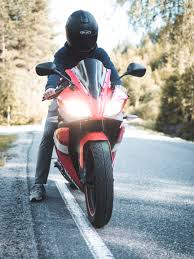
In over two-thirds of bike-car accidents, the driver didn’t see the motorcycle coming. Not being seen is a major cause of bike accidents. Seeing and being seen are essentially two sides of the same coin. Seeing uses your eyes to be safe, while being seen uses the eyes of others. Both can avoid accidents. If seeing is the best defense on a motorcycle, being seen is the next best. A bike is harder to see than a car because it is smaller and moves faster, so it is in your interests to be as visible as possible. Some ways to do this include:
- Headlights. Ride with headlights on at all times.
- Visible Gear. Wear light or bright helmet and clothing, with reflective strips for night-time.
- Position. Position yourself in front of cars so they see you, not on the side of the lane where they can also push past you.
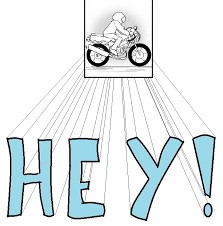
How to be seen? Some people walk into huge, slow-moving trains, so how will they see me on a little bike? People walk in front of trains when they are background noise, i.e. when the train isn’t doing anything to attract attention, like tooting its horn. On a motorcycle you want attention, and what gets attention is change. Changes that say “Hey, I’m here!” on a motorcycle include flashing, indicating, moving in-lane and using your horn.
High beam flashing
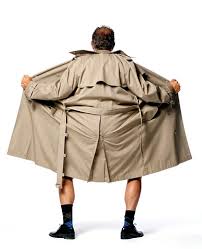
Flashers are people who want attention. They are saying “Look at me!” You can say the same by flashing your high beam. If you see a car ahead coming out of a side-street or driveway and aren’t sure it has seen you, flick on your high beam. This only takes a moment and in daylight is no big deal. They won’t be blinded by your beam but will see a change, which will get their attention. Note that driving with your high beam on all the time doesn’t have the same effect – it is the change that gets attention. Once you get the habit, it becomes easy.
Always indicate
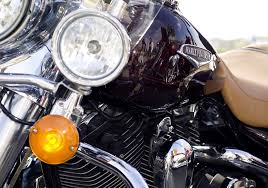
Indicators tell others what you are going to do. In surveys of what annoys other drivers most, not indicating is always up at the top. The riding safely rule is to always indicate, even when there is no-one around. This makes it a safety habit, an automatic thing you always do when you change lanes. Make no exceptions. Why indicate when no-one is around? It is precisely when you think there is no-one around that indicating can save your life. Make it a habit to always indicate turns and one day you will be glad you did. You don’t want to be the invisible man on the road. Give others a chance not to hit you – always indicate when you turn.
Moving in-lane
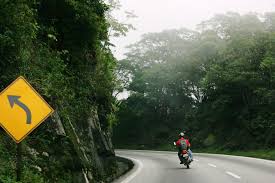
On a motorcycle, it is dangerous when cars overtake you. Many car drivers don’t realize where the back of their car is, so when they overtake and cut back in, the back of the car can hit you. Just a touch from a car can bring a motorcycle down. The car may go on without even noticing. So don’t let cars overtake and cut back in front of you. Keep your speed at the flow of the traffic, and “fill the lane” so they cant use it as well. This can include moving from side to side a bit to “occupy” it, which also makes you more visible. This is not for beginners, but cars are more cautious around bikes that “waggle” a bit.
Use your horn
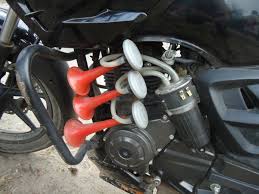
A horn blast is another great way to get noticed. In “polite” countries like New Zealand people rarely use their horn as it seems rude, like yelling at someone. But really its just letting the other person know you are there. If the car next to you starts to slide into your lane, press your horn! Maybe they are dozing off or adjusting their stereo. A good loud horn will alert them to your presence. If you ride a motorcycle and never use your horn, think about adding it to your repertoire. If your horn is just a “peep”, get a better one.
Avoid blind spots
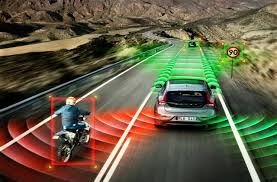
A sure way to not be seen is to ride in the blind spot of another vehicle. The blind spot for a car is outside their mirror view but not yet in direct sight of the driver. Its in front of a line about 45 degrees back from the driver. If you ride in a car’s blind spot you become invisible to them, so they may suddenly pull into your lane as they think it is empty. Don’t be invisible means never riding constantly in the blind spot of a car or truck.
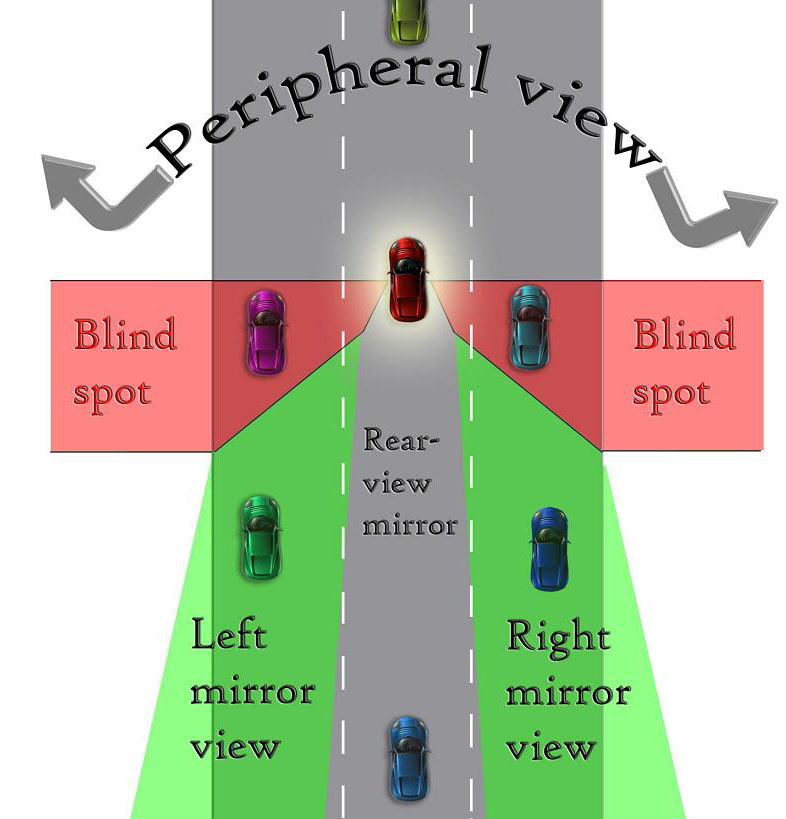
When riding alongside a car, be either back where they see you in their mirror or front where they see you through their windscreen. Treat moving from side-back to side-front of a nearby car like an overtake – don’t linger in their blind spot where they might not see you. This especially applies to large trucks and buses. You dont ever want to be alongside an articulated truck when it changes lanes. Bike vs. truck or bus is not a conflict you will win, as this video shows.
Undertaking

Undertaking is passing another vehicle on the inside using the road shoulder. When I was young, I did it a few times but now I dont, because cars dont expect a vehicle there. They assume they can pull off the road onto the shoulder without checking, so undertaking is aptly named because it is a good way to end up in a box. Indeed using the road shoulder as a lane is illegal in most places. In contrast, passing on the inside is legal for a stationary car, so this is not undertaking. Some see undertaking as a form of motorcycle “cheating” and may actively obstruct you, as in this video.